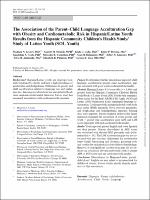Please use this identifier to cite or link to this item:
https://hdl.handle.net/20.500.12202/9363| Title: | The association of the parent-child language acculturation gap with obesity and cardiometabolic risk in Hispanic/Latino youth: Results from the Hispanic community children’s health study/study of Latino youth SOL youth) |
| Authors: | Gonzalez, Jeffrey S. LeCroy, Madison N. Strizich, Garrett M Gallo, Linda C Perreira, Krista P Ayala, Guadalupe X Carnethon, Mercedes R Delamater, Alan M Arredondo, Elva M Pulgaron, Elizabeth R Isasi, Carmen R |
| Keywords: | Hispanics Parent–child relations Acculturation Child youth language |
| Issue Date: | 2021 |
| Publisher: | Oxford UP |
| Citation: | LeCroy, M. N., Strizich, G. M., Gallo, L. C., Perreira, K. P., Ayala, G. X., Carnethon,M. R., Delamater, A. M., Gonzalez, J. S., Arredondo, E. M., Pulgaron, E. R., & Isasi, C. R. (2021). The association of the parent-child language acculturation gap with obesity and cardiometabolic risk in Hispanic/Latino youth: Results from the Hispanic community children’s health study/study of Latino youth SOL youth). Annals of Behavioral Medicine: A Publication of the Society of Behavioral Medicine, 55(8), 734–745. https://doi.org/10.1093/abm/kaaa114 |
| Series/Report no.: | Annals of Behavioral Medicine: A Publication of the Society of Behavioral Medicine;55(8) |
| Abstract: | Abstract Background Hispanic/Latino youth are disproportionately burdened by obesity and have a high prevalence of prediabetes and dyslipidemia. Differences in parent and child acculturation related to language use and preference (i.e., language acculturation) are associated with adverse cardiometabolic health behaviors, but no study has examined associations with cardiometabolic markers Purpose To determine whether discordance in parent–child language acculturation (parent–child acculturation gap) was associated with poor youth cardiometabolic health. Methods Hispanic/Latino 8–16-year-olds (n = 1,466) and parents from the Hispanic Community Children’s Health Study/Study of Latino Youth (SOL Youth) were examined. Mean scores for the Brief ARSMA-II’s Anglo (AOS) and Latino (LOS) Orientation Scales represented language acculturation. Cardiometabolic markers included youth body mass index (BMI) percentile, blood pressure percentiles, and dysglycemia and hyperlipidemia measures. Missing data were imputed. Survey-weighted multivariable linear regression examined the association of youth, parent, and youth × parent (the acculturation gap) AOS and LOS scores separately with each cardiometabolic marker. Results Youth reported greater English and lower Spanish use than parents. Greater discordance in AOS scores was associated with elevated BMI percentile only (p-forinteraction < .01). The LOS acculturation gap was not associated with any outcome. Adjustment for acculturative stress, family functioning and closeness, parenting style, and youth’s diet and physical activity did not alter findings. Removal of nonsignificant acculturation gaps did not indicate an association between individual youth or parent AOS or LOS scores and any cardiometabolic marker. Conclusions Discordance in Hispanic/Latino parent– child dyads’ English use may relate to increased risk for childhood obesity. Future studies should identify mediators of this association |
| Description: | Scholarly article / Open access |
| URI: | https://academic.oup.com/abm/article/55/8/734/6101159 https://hdl.handle.net/20.500.12202/9363 |
| ISSN: | Online ISSN 1532-4796 Print ISSN 0883-6612 |
| Appears in Collections: | Ferkauf Graduate School of Psychology: Faculty Publications |
Files in This Item:
| File | Description | Size | Format | |
|---|---|---|---|---|
| Gonzalez 2021 the association OA kaaa114.pdf | 311.97 kB | Adobe PDF |  View/Open |
This item is licensed under a Creative Commons License

